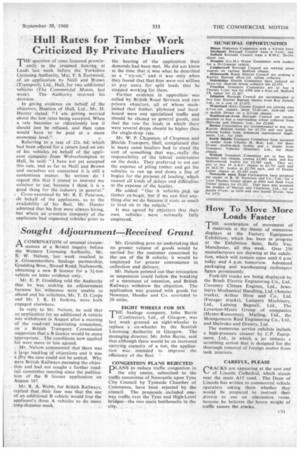Hull Rates for Timber Work Criticized By Private Hauliers
Page 67

If you've noticed an error in this article please click here to report it so we can fix it.
THEquestion of rates featured prominently in the resumed hearing at Leeds last week before the Yorkshire Licensing Authority, Maj. F. S. Eastwood, of an application by Neill and Brown (Transport), Ltd., Hull, for two additional vehicles (The 'Commercial Motor, last week). The Authority reserved his decision.
In giving evidence on behalf of the objectors. Hunters of Hull, Ltd., Mr. H. Hunter stated: "I am getting worried about the low rates being accepted. When a rate becomes so ridiculously low it should just be refused, and then rates would have to be paid at a more economic level."• Referring to a rate of 22s. 6d. which had been offered for a return load on onc of his vehicles on behalf of the applicant company from Wolverhampton to Hull, he said: "I have not yet accepted this rate, and as far as Neill and Brown and ourselves are concerned it is still a contentious matter. So serious do I regard this that I intend to instruct my solicitor to sue, because I think it is is good thing for the industry in general." . Cross-examined by Mr. R. E. Paterson, On behalf of the applicants, as to the availability of his fleet, Mr. Hunter admitted that his firm were always hiring, but where an vsociate company of the applicants had requested vehicles prior to
the hearing of the application their demands had been met. He did not know at the time that it was what he described as a "try-on,", and it was only when they found that that firm were not willing to pay extra for split loads that he stopped working for them.
Further evidence in opposition was called by British .Road Services and two private objectors, all of whom maintained that timber, plywood and hardboard were not specialized traffic and should be classed .as general goods, and that the rate for loads in which there were several' drops should be higher than the single-drop rate.
Mr. W. P. Chapman, of Chapman and Shields Transport, Hull, complained that in many cases hauliers had to stand the cost of something that was, really the responsibility of the labour contractors on the docks. They preferred to cut out the expense of piling timber and get the vehicles to run up and down a line of bogies for the purpose Of loading, which caused all kinds of delays and difficulties at the expense of the haulier. • He added: "Our A vehiclespick up timber ex-bogie, but if we can find thing -else we do because it costs so much to load on to the. vehicle." • It was agreed by objectors that their own vehicles were normally ftilly employed.
























































































































































































